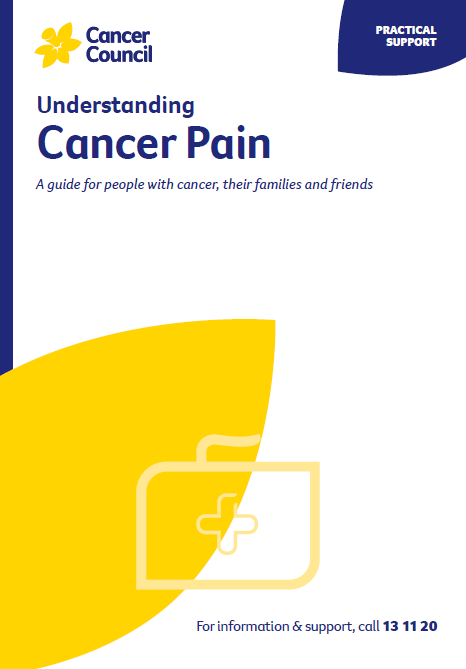- Home
- About Cancer
- Managing side effects
- Pain and cancer
- What is cancer pain?
- When can I use pain medicines?
When can I use pain medicines?
Take your pain medicine as prescribed to manage pain effectively. Learn when and how to use it for the best relief.
| Keeping pain under control | The aim is for pain to be continuously controlled. You should take your pain medicine as prescribed. Sometimes this means taking pain medicine even when you don’t feel pain. If pain lasts longer than a few days without much relief, or you notice you are in more pain than usual, see your doctor. It’s better to get relief early rather than allowing it to get worse. This makes it easier to control and means you are likely to have less pain overall. |
| Follow your doctor’s instructions | Your doctor will talk to you about how much medicine to take (the dose) and how often to take it (the frequency). |
| Common myths about pain management | Many people believe that they should put up with pain for as long as possible and that they should only use pain medicines when pain becomes unbearable. If you do this, it can mean that you are in pain when you don’t need to be. |
| Don’t wait for severe pain | There is no need to save pain medicines until your pain is severe. Severe pain can cause anxiety and difficulty sleeping. These things can make the pain feel worse and harder to control. Learn more about using pain medicines. |
| Talk to your doctor | If you think your pain medicine isn’t working or the pain returns before the next dose, it’s important to let your doctor know. They may need to adjust the dose, prescribe a different medicine or give an extra dose of medicine (breakthrough pain). |
If the pain doesn’t improve the first time you use a new pain relief method, try it a few more times. If you’re taking medicine that doesn’t seem to work or has stopped working, talk to your doctor – don’t change the dose yourself.
→ READ MORE: Who helps manage my pain?
Podcast: Managing Cancer Pain
Listen to more episodes from our podcast for people affected by cancer
More resources
Professor Paul Glare, Chair of Pain Medicine, Northern Clinical School, Faculty of Medicine and Health, The University of Sydney, NSW (clinical update); Dr Tim Hucker, Pain Specialist, Northern Beaches Hospital, Director, Northern Beaches Pain Management, NSW (clinical update); Dr Keiron Bradley, Palliative Care Consultant, Bethesda Health Care, WA; A/Prof Anne Burke, Co-Director Psychology, Central Adelaide Local Health Network, President, Australian Pain Society, Statewide Chronic Pain Clinical Network, SA, School of Psychology, The University of Adelaide, SA; Tumelo Dube, Accredited Pain Physiotherapist, Michael J Cousins Pain Management and Research Centre, Royal North Shore Hospital, NSW; Prof Paul Glare (see above); Andrew Greig, Consumer; Annette Lindley, Consumer; Prof Melanie Lovell, Palliative Care Specialist HammondCare, Sydney Medical School and The University of Technology Sydney, NSW; Caitriona Nienaber, 13 11 20 Consultant, Cancer Council WA; Melanie Proper, Pain Management Specialist Nurse Practitioner, Royal Brisbane and Women’s Hospital, QLD; Dr Alison White, Palliative Medicine Specialist and Director of Hospice and Palliative Care Services, St John of God Health Care, WA.
View the Cancer Council NSW editorial policy.
View all publications or call 13 11 20 for free printed copies.

